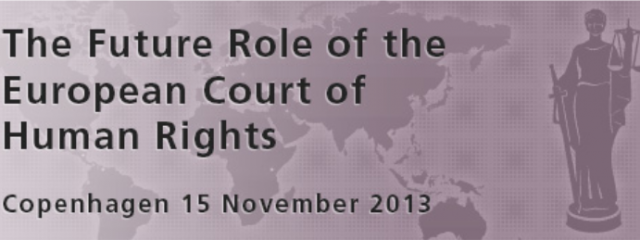Friday, 15th November 2013. Copenhagen, Denmark.
The Freedom Rights Project, in cooperation with the iCourts Centre of Excellence, recently co-hosted an international conference on the Future Role of the European Court of Human Rights. The conference featured a highly esteemed panel of legal professionals, academics and political representatives, including several national and European judges. There was also a strong turn out on the day by students, government representatives and members of civil society, who contributed to a meaningful and dynamic debate on a broad range of issues concerning the European human rights protection system and the future of the Court going forward.
The first session provided a crucial insiders’ perspective from the judiciary, which included both former and current members of the Court’s bench, as well as several domestic judges. The speakers were Marc Bossuyt, President of the Belgian Constitutional Court, Pauliine Koskelo, President of Finland’s Supreme Court, Judge Renate Jaeger (Germany), a former judge of both the German Bundesvervassungsgericht and the ECtHR, and Judge Paul Mahoney (the United Kingdom), a sitting member of the Court. Topics included the question of subsidiarity, with several of the national judges arguing that the ECtHR’s interpretation paid too little attention to this doctrine at the expense of national parliaments and courts. The outcome of the Brighton and Izmir conferences and how the Court is tackling the substantial challenge of reducing the backlog of cases pending before it (presently standing at over 107,000 cases) were other issues addressed. The panel debated the implications of contemporary legal developments at the Court, including the role of the “single judge” mechanism (Protocol 14), pilot judgments (Rule 61) and the potential impact of Protocol 16, which would allow the Court to issue advisory opinions to member states (not yet in force).
The Freedom Rights Project’s Jacob Mchangama chaired a thought-provoking session on the principle of subsidiarity, which prompted varying legal and political standpoints. To what extent the Court should exercise self-restraint, in line with the principle of subsidiarity, and when it should otherwise take a more “activist” role in certain categories of cases was a prominent topic of debate during the session. British MP Nick Herbert highlighted the potential blurring of the roles of the national legislature and the European judiciary, whereby cases such as Hirst v. the United Kingdom (No. 2) saw the Court extend the scope of the convention rights to domestic policy issues (concerning prisoners’ voting rights). A different perspective was suggested by Professor Eva Brems from University of Ghent, who stressed the importance of the ECtHR’s “living instrument” doctrine in order to protect victims of contemporary human rights violations. Further topics such as the criteria by which applicants should be able to access the ECtHR, as well as the relevant qualifications and backgrounds necessary to become a judge of the Court also provided for lively discussion among the panel, which included Professor Laurence Helfer from Duke University and Professor Francoise Hampson from the University of Essex.
The Freedom Rights Project will host its next human rights conference in Copenhagen in January 2014. Details on the programme and how to register will follow shortly.








 Freedom Rights Project
Freedom Rights Project